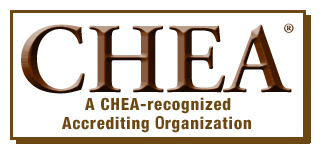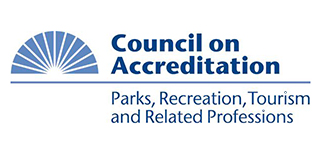CSU, Chico's Department of Recreation, Hospitality, and Parks Management is accredited by the Council on Accreditation of Parks, Recreation, Tourism and Related Professions (COAPRT). The Council on Accreditation of Parks, Recreation, Tourism and Related Professions (COAPRT) accredits baccalaureate programs in parks, recreation, tourism, sport management, event management, therapeutic recreation, and leisure studies offered at regionally accredited institutions within the United States and its territories, and at nationally accredited institutions in Canada, and Mexico.
University Accreditation
California State University, Chico is accredited by the Western Association of Schools and Colleges.
COAPRT Reporting
COAPRT standard 2.05.05 requires reporting of aggregated results of learning outcomes assessment and other evidence of program academic quality. Results for the most recent academic year (AY 2017-2018) follow:
- Standard 7.01 “Students graduating from the program shall demonstrate the following entry-level knowledge” a) the nature and scope of the relevant park, recreation, tourism, or related professions and their associated industries; b) techniques and processes used by professionals and workers in these industries; and c) the foundation of the profession in history, science, and philosophy”
Evidence: As measured by an informational interview with a professional (RHPM 200 – Foundations in Leisure and Recreation), 91.4% of students achieved this learning outcome (evidenced by scoring a 70% or better on this assignment). On the industry trend presentation, (RHPM 201 – Applications in RHPM), 98% of students achieved this learning outcome (evidenced by scoring a 70% or better on this assignment) The annual Senior Exit Survey, which is an indirect measure of this learning outcome, indicated that approximately 96% of graduating seniors feel they probably or definitely will be able to demonstrate entry-level knowledge in techniques and processes used by professionals and workers in these industries.
- Standard 7.02 “Students graduating from the program shall be able to demonstrate the ability to design, implement, and evaluate services that facilitate targeted human experiences and that embrace personal and cultural dimensions of diversity”
Evidence: As measured by a research paper in RHPM 260 (Recreation Therapy and Inclusion) 90% of students achieved this learning outcome (evidenced by scoring a 70% or better). The annual Senior Exit Survey, which is an indirect measure of this learning outcome, indicated that approximately 92% of graduating seniors feel they probably or definitely will be able to make sound decisions designing, implementing, and evaluating recreation services for diverse populations.
- Standard 7.03 “Students graduating from the program shall be able to demonstrate entry-level knowledge about operations and strategic management/administration in parks, recreation, tourism, and/or related professions”
Evidence: As measured by a case study and no-notes presentation in RHPM 400 (Management of Recreation and Parks) indicated 96% and 100% respectively of the students achieved this learning outcome. The annual Senior Exit Survey, which is an indirect measure of this learning outcome, indicated that approximately 88% of graduating seniors feel they probably or definitely will be able to demonstrate entry-level knowledge about strategic management/administration in parks, recreation, tourism, and/or related professions.
Our most recent Outcomes Assessment at a Glance summary is available for review. The AY 2017-18 Academic Program Review (APR) annual report and the department outcomes assessment plan are available upon request.
Important Information Regarding Degree Mills
Standard 3.06 requires us to publish the following important Information Regarding Degree Mills:
According to the Council for Higher Education Accreditation (CHEA), "Degree mills and accreditation mills mislead and harm. In the United States, degrees and certificates from mills may not be acknowledged by other institutions when students seek to transfer or go to graduate school. Employers may not acknowledge degrees and certificates from degree mills when providing tuition assistance for continuing education. "Accreditation" from an accreditation mill can mislead students and the public about the quality of an institution. In the presence of degree mills and accreditation mills, students may spend a good deal of money and receive neither an education nor a useable credential." Read more on the CHEA's website(opens in new window).


